Things I Learned in Japan (Part 2)
And the things I've tried implementing in my life since returning
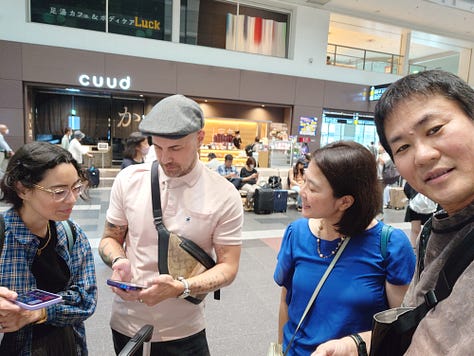

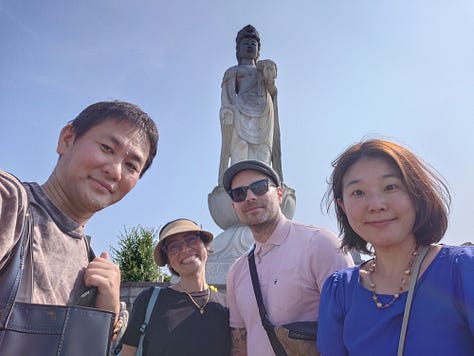
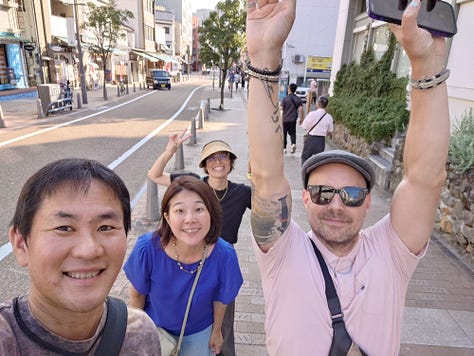
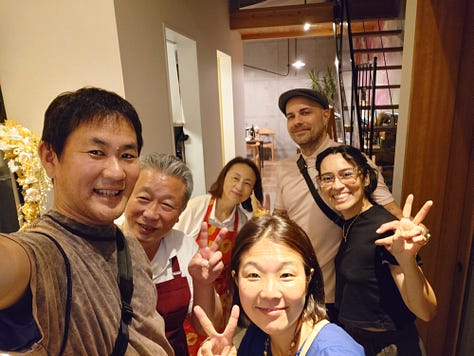
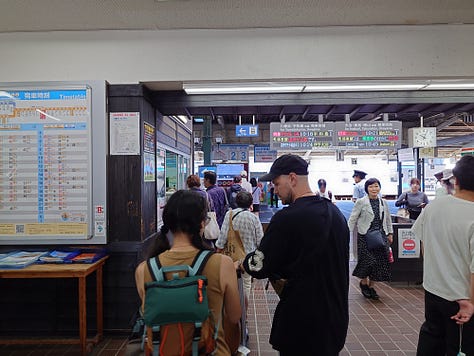
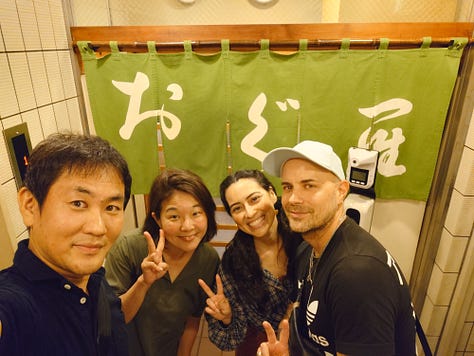

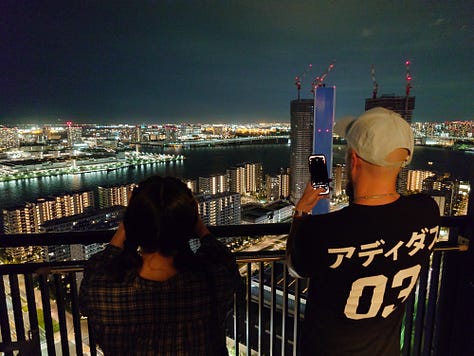
If you read my newsletter about my recent trip to Japan in September:
Things I Learned in Japan
Japan is the probably the only country I’ve ever visited where I’m always sad after I leave and where I’m always sad when I return. That’s not a diss on LA or an unconfessed blind-spot for Japan, it’s just what happens after every trip there and back from the motherland.
Then you know that I had a major psychic hangover after leaving Japan, and not just because I ate paella and drank local sake with my uncle Kazuya in Matsuyama and saw the Matsuyama Castle and ate oden in Ginza and drove around Tokyo and visited our ancestral grave in Iyo with my cousin Eikichi, and his wife, Megumi (because truthfully, words cannot express how grateful I am to my Japanese fam for planning such an amazing and life-changing trip in Shikoku and in Tokyo). But the psychic hangover was also because I had to return to reality in LA where I was forced to rummage through the debris of my old life in the States again where I’ve been slowly rebuilding a new home for myself professionally from the academic rubble, which is never fun but always necessary when you’re changing careers as I am. Even so, I’ve been thinking a lot about Japan this past week and realized there are more things I’ve learned and then there are also things I am trying to to apply to my life now:
I’ve stopped ordering vanilla with my iced oat lattes, which is so much harder than it seems in LA! I feel like only now do I truly appreciate the unique signature of different coffees. I still add some vanilla to the iced lattes I make at home because it has no sugar whatsoever, but I never add a lot. I think as an American, I have forgotten that vanilla is the passenger, not the driver, of the American coffee drink, but it’s easy to forget this rule with the Starbucksfication of coffee. Our brains have become programmed to connect sweetness to coffee in this country. Meanwhile, every protagonist in every K-drama I’ve watched, seems to order iced Americano without fail, but I’ve tried that and I just can’t get down with the bitterness. Besides, I love the aesthetics of a latte: the way the oat milk creates these gorgeous gradations of color inside the cup of coffee like an acrylic palette of light and darkness that slowly disappears after a series of dedicated swirls with your wrist.
It was the lack of vanilla at Japanese cafés that forced me to understand coffee on its own terms and I think I’m a better artist and human and being because of it.
I’ll probably never go back to using cash in the States but I have to say, I wish I could because I really appreciated how easy it was to keep track of purchases in Japan and Japanese yen were so clean and so crisp. Every bill felt brand new! The thing is, cash requires visits to the ATM machine, which slows down your spending habits just a tiny bit and makes you more aware of your spending habits too. Swiping, on the other hand, induces amnesia. Inside your head, you think you’ve spent around $86 that day and then you open up your credit union app and realize you’ve spent $367. This doesn’t happen with cash! I’ve contemplated getting rid of my debit card a million times since using it earns absolutely no points. And that leaves cash. But I see ATM machines so rarely these days in SoCal and American 7-11s are not Japanese 7-11s, as I discussed in my last Japan newsletter, so as much as I’d love to use cash like I did in Japan, I just don’t see think that’s feasible even though I know I’d be better off if I did.
When you’re fighting for your life in the Shibuya Crossing and trying not to walk into groups of schoolchildren or get trampled by commuters, you don’t have the luxury of figuring out who has the right of way like you do when you ride the escalator in Japan (where rules and group harmony are interconnected). Instead, the Shibuya Crossing forces you to live completely in the moment and adapt literally every second to the intersecting paths of others who have the same right as you do to reach their destination before the light changes. There is a literal process for achieving Zen in the Tokyo zebra crossing that I think is often ignored or misunderstood. Walking on the sidewalks in Shinjuku can be harder because people seemed to walk wherever there is space, not on the side they’re supposed to walk. In other Tokyo neighborhoods, it was much better and order was restored. In America, I find myself getting constantly annoyed when Americans walk down the wrong side of the sidewalk or when they take up the entire sidewalk or when they don’t make room for you when they’re walking in a group. That shit drives me crazy. Part of this has to do with the laziness and the entitlement and the protagonist delusion and the solipsism of Americans, who are terrible at acknowledging the rights of others and sharing space with them. We are very much a “me-me-me” culture until tragedy hits. But the point remains, why can’t I apply my lesson of spatial adaptation I followed in Japan to America? Why can’t I adapt to the conditions on the American sidewalk and stop obsessing about who has the right of way all the time? And the answer is I’m American, so I spend an inordinate amount of time getting mad at people who don’t follow the rules even though I know for a fact that I will break those same rules at some point in the future. Spiritually, this seems like an obvious lesson I need to learn and all I can say is, I’m working at it.
I’ve been working on eating smaller portions, walking even on days that I run (where I tend to chillax too much after my three-mile runs), drinking more green tea, and forcing myself to go out even on days when I have nothing to do, something that most Japanese are forced to do simply everyday while avoiding the things that I don’t think are healthy about Japanese culture, like drinking, smoking, & staying out late.
I’ve been much better at taking baths before I go to bed than before and it really soothes my soul. I’ve been taking baths since I was a bambino but as an adult I tend to take more baths on cold, Winter days, than in the summer. But every time I travel to Japan, I feel almost obligated to take advantage of Japanese baths in our hotel rooms, which are surprisingly deep if not compact. And besides my running days where I really need to take a shower after sweating badly—the least Asian part about me, sadly—my plan is to return to my Japanese bath schedule and take baths at night: it frees up your day when you get ready, you can cleanse yourself of the day after you get home, like literally rinse the day off of you and soak in the primal warmth of hot water, & you help your body make the transition from hyperactivity to non-activity. Last thing: I’ve noticed that my baths are much better if I don’t bring my phone because I’m much more present but also, I waste a lot less time and my baths are much shorter.
One thing I’ve noticed since being back, and especially after watching the newest season of Selling Sunset is the role that arrogance plays in the American identity. Like, if we aren’t boasting about (or constantly drawing attention to) how beautiful and rich and strong and smart and unstoppable and powerful we are, are we really American? And while, of course, I get the appeal of seeing women act in the same way that men have forever both on Netflix and in corporate America, it’s not exactly comforting to see how Americans perform Americanness. If anything, it’s fucking depressing because swag and pomposity and beauty and cruelty is just an intrinsic part of the American ethos, but I have no desire to reinforce this quintessential American profile. If anything, I find myself wanting to subvert it intentionally.
If anything, I’m reminded of a conversation I once had with the Japanese American author, Mary Yukari Waters, the author of The Laws of Evening, who once told me that it’s vital that you have confidence as an aspiring writer, but it’s important that your confidence be quiet. In other words, you don’t need to boast to people how talented you are, how successful you are, how many books you’ve published, how much people love your work, or even how much confidence you have as an author. It’s enough that your confidence is there, working in the background like an éminence grise.
I bring this up because in Japan, you don’t talk about how great you are, you do the opposite. You speak humbly about yourself and you raise up everyone around you. This is true both culturally and grammatically where the language you use to describe yourself is humble whereas the language you use to ask other people about their family, for example, is already in honorific form. And while, ironically, I’m not humble enough to do justice to this Japanese convention all the time, I think I want to learn from it and find ways to employ it in my everyday life because it will keep me grounded, make me a little more humble, & help me see the worth in others first. And the truth is, LA has taught me the nausea of listening to people talk about how great they are all the time. It’s exhausting. It’s annoying. It’s delusional. And it’s commonplace. And while I certainly have things I can flex about, this doesn’t mean I need to. This doesn’t mean I should. Ultimately, I’m at the age where I want my work to speak for itself whether my “work” is my body of work (e.g., my published books, short stories, & essays) or my ideas in a conversation or my behavior in a situation or the language I use in an exchange, those are the things that I think speak best for me. America already has enough sales people. What it lacks are people who get shit done quietly without talking about how great they are while doing it.
Authentic gratitude. Americans practice gratitude, but often it’s part of their spiritual belief system. Like, “I believe in the power of gratitude” or “I jot down something in my gratitude journal everyday.” I mean, if those things work for you, by all means go for it. But gratitude in America, by and large, feels culturally gimmicky to me. It feels like an offshoot of New Age spirituality. In the ‘80s we were obsessed with the solar system and space travel and New Age electronic music (think Kitaro) and now we’ve graduated to gratitude journals and family holidays where people go around the table talking about the things they’re grateful for. To me, that’s what I’d consider loud gratitude. The kind of gratitude where it’s not just enough to be aware of your gratitude, you have to inform the world of what you learned about yourself and your life. You have to tell the world how grateful you are for your gratitude. But this gratitude feels performative and only half sincere. Just the fact that gratitude is a trend in America shows me that gratitude is not intrinsic to our culture at all. But one thing that Asian culture in general and Japanese culture in particular is very good at, is ancestral worship, and I have to say that this is one of several ways that I experienced gratitude very deeply in Japan. I was grateful to be part of a Japanese family. Grateful to be part of a Japanese family tree. Ditto with my Japanese family, who does the kindest and sweetest things every time I visit without asking for anything in return. But the question, at least for me, is: how do I receive gratitude, how do I experience gratitude, & how do I show gratitude in my daily life so that my gratitude is always authentic? How do I show gratitude without using it to get approval from others for performing my gratitude as so many Americans do? I don’t know. I’m still working on the answers. But I’m pretty sure that part of the answer is probably quiet gratitude and another part is probably expressing gratitude with selfless motivation. I guess it’s the difference between wanting people to know how much I appreciate them versus wanting them to know that I am a person who is capable of appreciation. The first is about them. The second is about me. And Americans, as we all know, learn first-person pronouns before anything else. Sometimes, it’s the only pronoun they know until college hits them like a nasty left hook.




